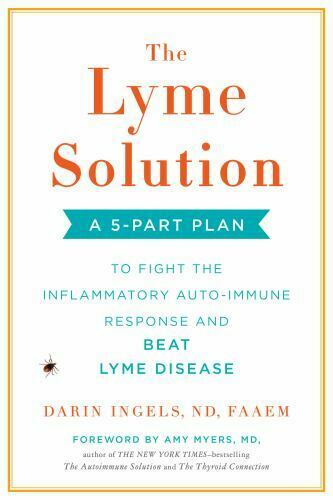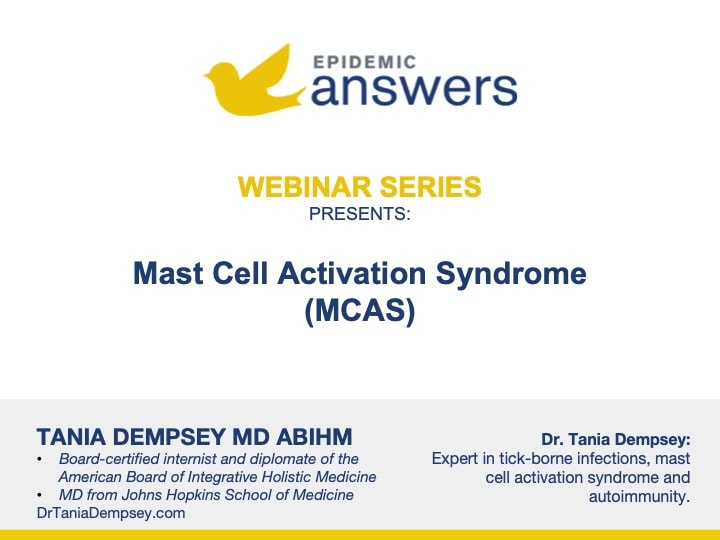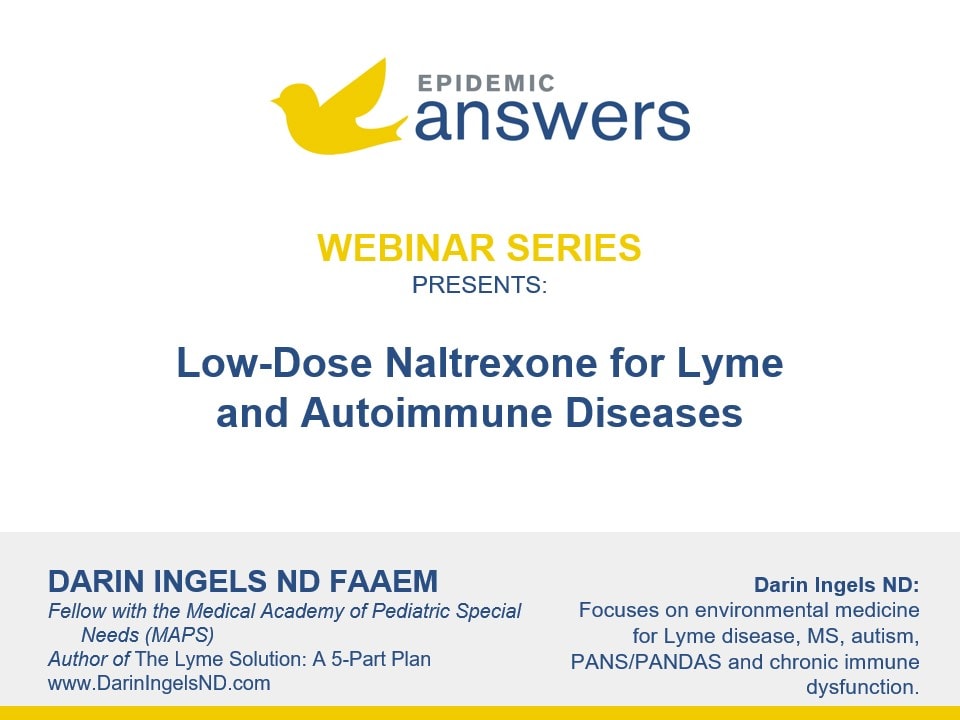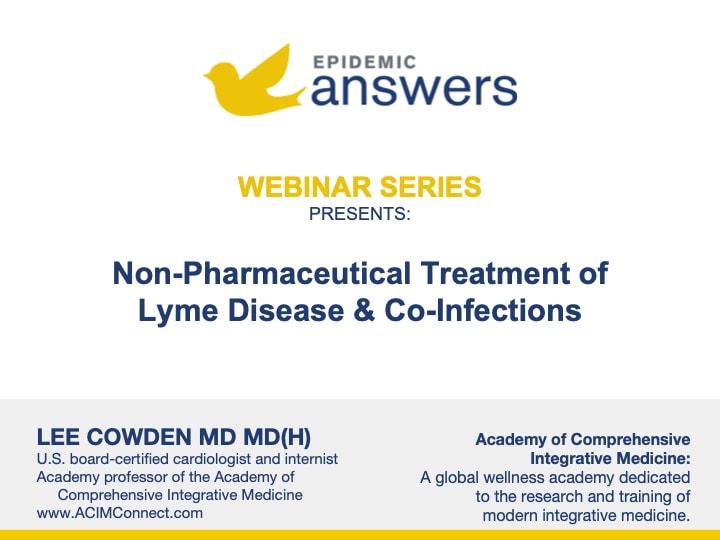In this book, Dr. Ingels states that antibiotics aren’t enough in treating Lyme disease. Why? Because most physicians treat for too short of a time and because if antibiotics are used for longer periods such as months or years, which is common, then the patient is left with more health problems as a result.
A big part of the problem is that most doctors just aren’t well-educated on this insidious disease and how it can mimic hundreds of other chronic health conditions, especially neurological disorders, autoimmune disorders and mood/behavioral disorders.
Testing for Lyme Disease
Most doctors will follow the CDC’s recommendations when testing for Lyme. First, they’ll typically run an ELISA (Enzyme-Linked Immunosorbent Assay) or the Lyme screen test. Then they may run the Lyme Western blot antibody test.
Dr. Ingels explains the pitfalls of these common Lyme screening tests, the main one being that these tests generate many false negatives, meaning that if the test is negative, most physicans will assume that you don’t have Lyme. However, this is often not the case. More experienced practitioners know that Lyme is really a clinical diagnosis, meaning that if it looks like a duck and quacks like a duck, it is probably a duck even though the initial tests say that it’s not a duck.
In addition, it is very common that coinfections such as Babesia, Bartonella (cat-scratch fever), Anaplasma, Mycoplasma, Rickettsia (Rocky Mountain Spotted Fever) and Ehrlichia are not tested for.
There are more sensitive tests from companies such as IGeneX, Medical Diagnostic Laboratories and Galaxy Labs that can be used to better identify Lyme and its coinfections. However, insurance typically doesn’t cover the cost of these tests, especially if the diagnostic code is for Lyme disease. Learning how to read these test results is both an art and a science, so it’s best to work with a Lyme-literate practitioner, such as those that have been trained by ILADS, the International Lyme and Associated Diseases Society, of which Dr. Ingels is a member.
Treating Lyme Disease with the Five-Stage Immune-Boosting Plan
Dr. Ingels has developed a five-part plan that uses a functional-medicine approach and utilizes his training as an environmental-medicine practitioner. The plan takes a whole-body approach because Lyme disease (and any chronic health condition) affects the whole body.
Repairing the Gut to Strengthen the Immune System
The gut is the main component of the immune system, therefore it makes sense to address its health first. Many people with Lyme as well as other chronic health condition have chronic gut dysfunction, which may be one of the reasons why they have their condition in the first place. Chief among these complaints is chronic constipation and/or diarrhea.
Gut problems stem from gut dysbiosis and inflammation, which can cause the vicious cycle of leaky gut. Dr. Ingels offers specific advice about probiotics, glutamine, digestive enzymes, fish oil, resveratrol and herbs, including specific names, brands and dosages of these supplements. Happily, he also mentions the use of colon hydrotherapy, otherwise known as colonics, as a therapy to help repair the gut.
Following the Immune-Boosting Diet
Dr. Ingels’ Immune-Boosting Diet combines knowledge of many gut-healing diets with the added twist of eating foods that increase the body’s alkalinity and omitting acid-forming foods. He developed the diet after implementing it for himself and realized that he felt much better with a more-balanced pH for reasons discussed in the book.
Organic foods are preferred, as they should be when looking to improve health, and the impact of food sensitivities and intolerances is addressed with his 17-food elimination diet; ours contains the top eight.
The only potential drawback to the diet is that it is a carbohydrate-heavy diet, although these carbohydrates come from whole gluten-free grains, fruits and vegetables. Individuals who are glycemically sensitive to carbohydrates may want to switch out some of these carbohydrates for the healthy fats he recommends.
Targeting Active Infection with Natural Herbs and Other Substances
This section of the book is worth its weight in gold, as Dr. Ingels reviews his top five herbal protocols for treating Lyme: The Zhang protocol (his “go-to” protocol), the modified Cowden protocol, Byron White formulas, the Stephen Buhner protocol and the Beyond Balance protocol. Because each person is different, not every person will respond the same to a given protocol.
Dr. Ingels offers specific advice about using an herbal protocol, such as how to begin, how to continue, when to change protocols and recommendations by age group. He details specific herbs used in each protocol and includes dosing recommendations. As always, though, we recommend working with a knowledgeable practitioner rather than going it alone.
Transforming Immediate Surroundings to Support Immune-System Health
Dr. Ingels is a Fellow of the American Academy for Environmental Medicine, and he puts his training to good use in this section. He explains how the body burden of toxins places added stress on the body, and he offers specific, nontoxic product suggestions for personal care, home and yard. He specifically addresses mold because as he writes “nothing looks more like Lyme disease than toxic-mold exposure.” He also points out that “people with Lyme disease seem to have a special sensitivity to mold and should take appropriate measures to minimize their exposure.
Reducing Stress Level and Getting More Sleep and Exercise
A body that’s in a state of stress cannot heal, so it’s important to lower stress levels and get better sleep. Stress is not only from emotional issues, but it can also come in the form of biological, structural, environmental, educational and physical stress (such as from vision, auditory and sensory issues). Dr. Ingels provides recommendations for specific supplements that can help with sleep as well as tools for managing stress in this section.
Treating Chronic Lyme
For the tough Lyme nuts to crack, Dr. Ingels discusses novel ways to boost the immune system such as:
- Ways to overcome chronic fatigue including recommendations for specific supplements
- How to overcome neuropathy with specific supplements, PEMF (Pulsed Electromagnetic Frequency) and/or IVIG (IntraVenous ImmunoGlobulin)
- Taking control of the immune system with immunotherapies such as SubLingual ImmunoTherapy (SLIT), Low-Dose Immunotherapy (LDI) and Low-Dose Naltrexone (LDN)
- Using homeopathy
Summary
If you could only buy ONE book to learn how to treat both acute and chronic Lyme disease, this is the book you should buy. Educate and empower yourself by reading this book, and you’ll save yourself a lot of time, money and frustration.
About Darin Ingels ND FAAEM
Dr. Ingels is a respected leader in natural medicine with numerous publications, international lectures and 30 years experience in the healthcare field.
He received his Bachelor of Science degree in medical technology from Purdue University and his Doctorate of Naturopathic Medicine from Bastyr University in Seattle, Washington. Dr. Ingels completed his residency at the Bastyr Center for Natural Health.
Dr. Ingels is a licensed Doctor of Naturopathic Medicine in the State of California. He is a Fellow with the American Academy of Environmental Medicine and Fellow with the Medical Academy of Pediatric Special Needs.

Dr. Ingels has been published extensively and is the author of three books, The Natural Pharmacist: Lowering Cholesterol, Natural Treatments for High Cholesterol and The Lyme Solution: A 5-Part Plan To Fight The Inflammatory Autoimmune Response And Beat Lyme Disease. He has also written a chapter on allergy desensitization for autistic children in Cutting Edge Therapies for Autism.
Dr. Ingels’ practice focuses on environmental medicine with special emphasis on Lyme disease, MS, autism, Pediatric Acute-onset Neuropsychiatric Syndrome (PANS and PANDAS) and chronic immune dysfunction, including allergies, asthma, recurrent or persistent infections and other genetic or acquired immune problems.
His practice is comprised of both children and adults. He uses diet, nutrients, herbs, homeopathy, and immunotherapy along with conventional medical therapies to help his patients achieve better health.
You can find out more about him and his practice at dariningelsnd.com
Still Looking for Answers?
Visit the Epidemic Answers Practitioner Directory to find a practitioner near you.
Join us inside our online membership community for parents, Healing Together, where you’ll find even more healing resources, expert guidance, and a community to support you every step of your child’s healing journey.
Sources & References
Bransfield, R.C., et al. The association between tick-borne infections, Lyme borreliosis and autism spectrum disorders. Medical Hypotheses. 2008;70(5):967-74.
Brorson, O., et al. Grapefruit seed extract is a powerful in vitro agent against motile and cystic forms of Borrelia burgdorferi sensu lato. Infection. 2007 Jun;35(3):206-8.
Cantorna, M.T., et al. 1,25-Dihydroxycholecalciferol inhibits the progression of arthritis in murine models of human arthritis. J Nutr. 1998 Jan;128(1):68-72.
Cantorna, M.T., et al. Vitamin A deficiency exacerbates murine Lyme arthritis. J Infect Dis. 1996 Oct;174(4):747-51.
Feng, J., et al. Evaluation of Natural and Botanical Medicines for Activity Against Growing and Non-growing Forms of B. burgdorferi. Front. Med., 21 Feb 2020.
Feng, J., et al. Selective Essential Oils from Spice or Culinary Herbs Have High Activity against Stationary Phase and Biofilm Borrelia burgdorferi. Front Med (Lausanne). 2017 Oct 11;4:169.
Ferreira Maya, M., et al. Plant-based insect repellents: a review of their efficacy, development and testing. Malar J. 2011; 10(Suppl 1): S11. Published online 2011 Mar 15.
Hutschenreuther, A., et al. Growth inhibiting activity of volatile oil from Cistus creticus L. against Borrelia burgdorferi s.s. in vitro. Pharmazie. 2010 Apr;65(4):290-5.
Javid, A., et al. Hyperglycemia Impairs Neutrophil-Mediated Bacterial Clearance in Mice Infected with the Lyme Disease Pathogen. PLoS One. 2016 Jun 24;11(6):e0158019.
Kepka, A., et al. Serum carnitine concentration is decreased in patients with Lyme borreliosis. Postepy Hig Med Dosw (Online). 2016 Mar 4;70:180-5.
Lee, S.H., Vigliotti, J.S., Vigliotti, V.S., Jones, W., Moorcroft, T.A., Lantsman K. DNA sequencing diagnosis of off-season spirochetemia with low bacterial density in Borrelia burgdorferi and Borrelia miyamotoi infections. Int J Mol Sci. 2014;15(7):11364–11386. 2014 Jun 25.
Lovegrove, M.C., et al. US Emergency Department Visits for Adverse Drug Events From Antibiotics in Children, 2011–2015. Journal of the Pediatric Infectious Diseases Society, piy066. 2018 Aug 23.
Lubke, L.L., et al. The antimicrobial agent melittin exhibits powerful in vitro inhibitory effects on the Lyme disease spirochete. Clin Infect Dis. 1997 Jul;25 Suppl 1:S48-51.
Socarra, K.M., et al. Antimicrobial Activity of Bee Venom and Melittin against Borrelia burgdorferi. Antibiotics (Basel). 2017 Nov 29;6(4). pii: E31.
Theophilus, P.A., et al. Effectiveness of Stevia Rebaudiana Whole Leaf Extract Against the Various Morphological Forms of Borrelia Burgdorferi in Vitro. Eur J Microbiol Immunol (Bp). 2015 Nov 12;5(4):268-80.
Troxell, B., et al. Manganese and zinc regulate virulence determinants in Borrelia burgdorferi. Infect Immun. 2013 Aug;81(8):2743-52.
Resources
Buhner, Stephen Harrod. Healing Lyme Disease Coinfections: Complementary and Holistic Treatments for Bartonella and Mycoplasma. Healing Arts Press, 2013.
Buhner, Stephen Harrod. Healing Lyme: Natural Healing of Lyme Borreliosis and the Coinfections Chlamydia and Spotted Fever Rickettsiosis, 2nd Edition. Raven Press, 2015.
Buhner, Stephen Harrod. Herbal Antivirals: Natural Remedies for Emerging & Resistant Viral Infections. Storey Publishing, 2013.
Buhner, Stephen Harrod. Herbal Antibiotics, 2nd Edition: Natural Alternatives for Treating Drug-resistant Bacteria. Storey Publishing, 2012.
Buhner, Stephen Harrod. Natural Treatments for Lyme Coinfections: Anaplasma, Babesia, and Ehrlichia. Healing Arts Press, 2015.
Chutkin, Robin. The Microbiome Solution: A Radical New Way to Heal Your Body from the Inside Out. Avery, 2016
Ingels, Darin. The Lyme Solution: A 5-Part Plan to Fight the Inflammatory Auto-Immune Response and Beat Lyme Disease. Avery, 2019.
Zhang, QingCai, et al. Lyme Disease and Modern Chinese Medicine. Sino-Med Research Institute, 2006.
Websites
Bill Rawls MD: How I Recovered from Fibromyalgia and Lyme
Center for Homeopathy: Treating Lyme Disease with Homeopathy
Children’s Lyme Disease Network
Dr. Cindee Gardner: Treating Lyme Disease Naturally & Effectively
Dr. Jay Davidson: What’s the Connection Between Toxic Mold and Lyme Disease?
Dr. Jay Davidson: Removing Parasites to Fix Lyme and Chronic Illnesses
Gordon Crozier DO: How This Doctor Finally Diagnosed His Lyme Disease
Homeopathy Plus: Homeopathy for Late-Stage Lyme Disease
Joette Calabrese: Protocol for Lyme Disease Using Homeopathy
Kent Holtorf MD: Innovative “Alternative” Therapies for Chronic Lyme Disease
Klinghardt Academy: The Treatment of Lyme Disease with Bee Venom
New England PANS/PANDAS Association
Videos
Bose Ravenel, MD: UnderLyming Factors in Autism – A Functional Medicine Approach




